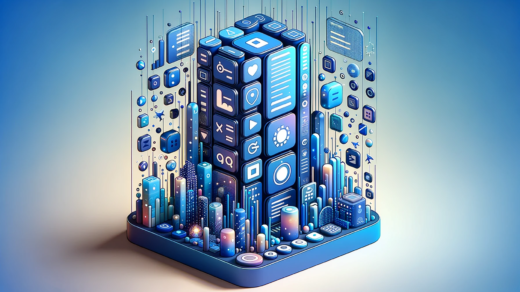5G Networks: The world’s technology is quickly evolving, and we may expect further transformations in the future. 5G networks are one of the most anticipated technologies. 5G networks are fifth-generation mobile networks that provide faster internet speeds, improved coverage, and reduced latency than prior networks.
In this post, we will go over all you need to know about 5G networks, including their benefits, how they function, and the influence they will have on sectors.
What are 5G Networks?
5G networks are the wireless networks of the future. They are intended to provide quicker data transmission rates, reduced latency, and more coverage than earlier networks. 5G networks operate on a different radio band than earlier networks, allowing for greater data transfer speeds.

The Benefits of 5G Networks
The benefits of 5G networks are numerous. Here are some of the advantages of 5G networks:
1) Faster Data Transfer Speeds
Data transfer speeds on 5G networks are quicker than on previous networks. This means you can download and upload files considerably more quickly than previously. A full-length movie may be downloaded in seconds using 5G networks.
2) Lower Latency
The latency of 5G networks is lower than that of earlier networks. The time it takes for a device to interact with the network is referred to as latency. The latency of 5G networks is so low that it is virtually immediate. This means you can watch films and play games with little to no latency.
3) Better Coverage
5G networks outperform earlier networks in terms of coverage. This implies that you may expect higher reception in previously unreachable regions.
4) More Reliable Connections
5G networks are more dependable than older networks. This translates to fewer lost calls and a more steady internet connection.
How Does 5G Network Work?
5G networks operate on a different radio frequency than earlier networks. Millimetre waves, which have a greater frequency than earlier networks, are used in 5G networks. These waves may carry more information, allowing for higher data transfer rates.
5G networks also employ several antennas, which improves coverage and reliability. These antennas collaborate to produce a network capable of handling more data than prior networks.
The Impact of 5G Networks on Industries
The influence of 5G networks on numerous industries is expected to be enormous. Here are some of the ways 5G networks will affect many industries:
1) Healthcare
The influence of 5G networks on healthcare will be considerable. Doctors will be able to remotely monitor patients via 5G networks, which will improve patient care. 5G networks will also enable more rapid and accurate diagnosis and treatment.
2) Education
The influence of 5G networks on education will be considerable. Students will be able to access educational resources quicker and more reliably than ever before thanks to 5G networks. More engaging and interactive learning experiences will be possible as a result.
3) Transportation
The impact of 5G networks on movement will be enormous. Self-driving cars will be able to communicate continually with each other and with the network thanks to 5G networks. This will make travel safer and more efficient.
4) Manufacturing
Manufacturing is going to be greatly affected by 5G networks. 5G networks will enable industries to utilize sensors to monitor machinery and equipment in real-time. This will allow for improved manufacturing and greater maintenance.
5) Entertainment
5G networks will have a huge influence on entertainment. Streaming providers will be able to deliver higher-quality video and audio material to viewers thanks to 5G networks. This will enable more immersive and entertaining entertainment experiences.
Conclusion
5G networks are the next generation of wireless networks that offer faster data transfer speeds, lower latency, and better coverage than previous networks.
Read More:
VR vs AR | What are Virtual Reality and Augmented Reality?
A Complete Details About Computing Power & Quantum Computing
The Rise of Artificial Intelligence in the Healthcare Industry
What is Chat GPT/GPT-4? Is Chat GPT Free or Paid?
A List of Currency Converter APIs Free for Developers in 2023
FAQs
How fast is 5G compared to 4G?
5G is significantly faster than 4G. While 4G networks may provide up to 100 Mbps, 5G networks are able to offer as much as 10 Gbps. That is, 5G networks are about 100 times faster than 4G networks.
Will I need to upgrade my phone to use 5G?
Yes, you will need to update your phone to use 5G. 5G networks employ a new sort of radio spectrum than prior networks, thus your phone must be 5G capable in order to use it. Most modern smartphones are 5G-ready, however, older devices may not be.
Is 5G dangerous to my health?
There is presently no proof that 5G networks are hazardous to human health. 5G networks employ radio waves that are comparable to those used by earlier networks. According to the World Health Organisation, there is no solid evidence that radio waves from mobile phones and other wireless devices are detrimental to human health.
How widespread is 5G coverage?
5G coverage is now confined to specific places, although it is quickly spreading. 5G coverage may be limited in certain regions to select portions of the city or locales. However, as more infrastructure is created, 5G coverage is likely to expand.
How much does 5G cost?
The pricing of 5G networks and services may vary depending on your carrier and the package you select. Some carriers may charge an additional fee for 5G service, while others may offer it as part of their basic plans. It is critical to consult with your carrier to determine the cost of 5G service
What is the range of 5G networks?
The range of 5G networks might vary based on the frequency utilized. Low-band 5G has a range of many miles, whereas high-band 5G has a range of a few city blocks. With a range of a few thousand feet, mid-band 5G provides a good blend of coverage and speed.
Will 5G replace Wi-Fi?
While 5G networks provide faster speeds and better coverage than Wi-Fi, they are unlikely to replace Wi-Fi. Wi-Fi is critical for many devices and applications, particularly in homes and businesses. Furthermore, 5G networks are anticipated to be more expensive than Wi-Fi for the majority of customers.
Can 5G networks be hacked?
5G networks, like any wireless network, are subject to hacking. 5G networks, on the other hand, utilize improved encryption and security measures to prevent hacking and cyber assaults.
Will 5G require more cell towers?
5G networks will need more cell towers than prior networks, particularly for high-band 5G. However, 5G networks employ tiny cells and other equipment to increase coverage and minimize the need for huge cell towers.
How will 5G networks impact data caps and usage?
Data limits and use may be affected by 5G networks, since higher speeds and reduced latency may entice consumers to consume more data. Some carriers may provide 5G subscriptions with limitless data, while others may impose tougher data limitations to regulate network traffic.






1 Response
[…] 5G Networks: A Complete Introduction about 5G Networks […]